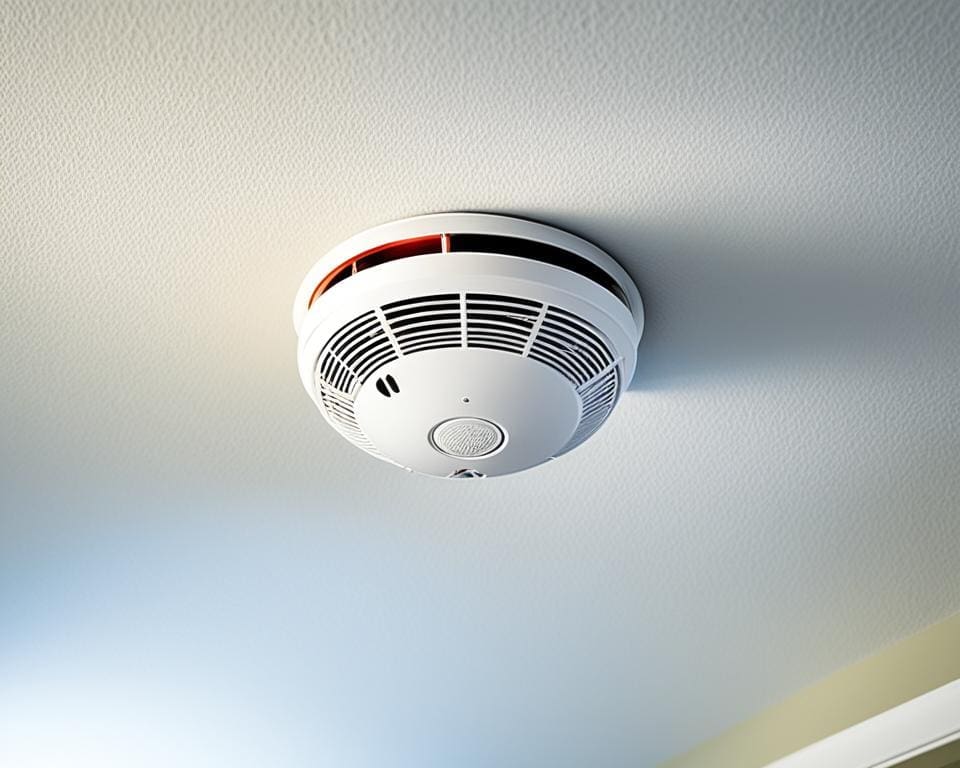Smoke detectors are key to keeping homes safe. They give an early alert that can save lives by allowing people to get out quickly in a fire. It’s crucial to have enough smoke detectors in your home. They should be on every level and near where people sleep. This greatly raises the chances of waking up in time during a fire.
Every year, the UK sees over 50,000 house fires. This shows why it’s so important to have smoke detectors properly installed and kept up to date. Testing them regularly and changing the batteries once a year are critical steps. Also, the law says that some houses, like rentals, must have smoke alarms to keep people safe. By knowing how important smoke detectors are, you protect your home and your loved ones.
Why Every Home Needs Smoke Detectors
Smoke detectors are crucial for home safety. They quickly sense smoke and heat, giving people time to escape if there’s a fire. Having these devices in your house can drastically cut the risk of danger from fires.
Understanding the Role of Smoke Detectors in Fire Safety
It’s important for every home to have smoke alarms. But just having smoke alarms isn’t enough. Using them along with heat alarms in areas like kitchens offers better protection. This approach helps catch fires early, raising the chances of getting out safely.
Statistics on Household Fires in the UK
The numbers show why fire safety is crucial. Over 50,000 house fires happen in the UK every year. Having working fire alarms gives you time to act before things get worse, potentially saving lives and homes.
Legal Requirements for Smoke Alarms in Homes
UK laws say rental homes must have a smoke alarm on each floor. This rule aims to make homes safer. While private houses have guidelines to follow, adding alarms in bedrooms and common areas is wise for extra safety against fires.

Smoke Detectors: Essential for Every Home
Smoke detectors are vital for keeping homes safe from fires. They help stop fires early and save lives. Knowing the different kinds and how they work makes homes safer.
Types of Smoke Detectors and Their Uses
There are mainly two kinds: photoelectric and ionisation. Photoelectric smoke detectors detect slow-burning fires well. They’re best for bedrooms and living spaces. Ionisation smoke detectors quickly notice fast flaming fires, perfect for kitchens. Using both types in your home covers more risks.
Importance of Interconnected Smoke Alarms
Linking smoke alarms together is key for early fire detection. If one alarm goes off, they all do. This keeps everyone informed straight away. It’s especially useful in big houses or for people who might not quickly escape. Adding Carbon Monoxide Alarms to the mix increases safety against fires and carbon monoxide. This way, your family is safer.
Proper Installation and Maintenance of Smoke Detectors
Having your smoke detectors correctly installed and well-maintained can save both lives and properties. It’s important to place them carefully to work best. Installation guidelines advise having detectors in every bedroom, near sleeping areas, and on all levels of the home. For rooms with high ceilings, set the alarms close to the top but not at the peak. Also, keep them away from kitchens to avoid false alarms caused by cooking.
Best Locations for Smoke Detector Installation
For increased safety, install smoke alarms in bedrooms and close to potential fire start points. Using interconnected smoke alarms is very helpful. When one alarm goes off, they all do, making sure everyone is alerted. This feature is especially useful at night, when it’s harder to notice smoke.
Regular Maintenance Tips for Longevity
Maintaining your smoke alarms is key to their reliability. Test them every month and change batteries when you hear the low-battery signal. Follow the manufacturer’s advice and change batteries annually for best performance. Clean your smoke alarms gently to avoid blocking them. Replace your smoke alarms every ten years to keep your home safe.








